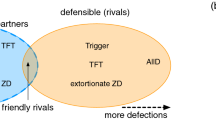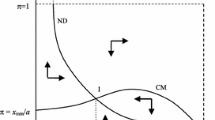Abstract
Reciprocal altruism occurs when individuals help those who help others. It is important as a potential explanation for why human beings have evolved cooperative behavior. Most of the previous studies of reciprocal altruism were based on one of the forms of reciprocity: direct reciprocity, indirect reciprocity, generalized reciprocity, and third-party influence. Recently, several studies have dealt with the interactions among these forms of reciprocity. We constructed a computational model of cooperation in which individuals repeat playing the prisoner’s dilemma game by selecting a strategy based on their behavioral predispositions concerning the four forms reciprocity, and the predispositions evolve according to the game results. We found that a high level of cooperation was achieved only when the population evolved to be dominated by direct reciprocity or dominated by indirect reciprocity. The latter scenarios were further classified into two. The first scenario is direct reciprocity increased, and then indirect reciprocity took the place of it, in addition to the other typical scenario that the indirect reciprocity just grows and dominates the population in the early stage of evolution. It was also suggested that generalized reciprocity could play some role during the course of the evolution of cooperation promoted by direct or indirect reciprocity.








Similar content being viewed by others
Explore related subjects
Discover the latest articles, news and stories from top researchers in related subjects.References
Rand DG, Nowak MA (2013) Human cooperation. Trends Cogn Sci 17(8):413–425
Nowak MA (2006) Five rules for the evolution of cooperation. Science 314:1560–1563
Hamilton WD, Axelrod R (1981) The evolution of cooperation. Science 211(27):1390–1396
Alexander RD (1987) The biology of moral systems. Transaction Publishers, Piscataway
Boyd R, Richerson PJ (1989) The evolution of indirect reciprocity. Soc Netw 11(3):213–236
van Doorn GS, Taborsky M (2012) The evolution of generalized reciprocity on social interaction networks. Evolution 66(3):651–664
Tsvetkova M, Macy MW (2014) The social contagion of generosity. PLoS One 9(2):e87275
Weber JM, Murnighan JK (2008) Suckers or saviors? Consistent contributors in social dilemmas. J Personal Soc Psychol 95(6):1340–1353
Herne K, Lappalainen O, Kestilä-Kekkonen E (2013) Experimental comparison of direct, general, and indirect reciprocity. J Socio-Econ 45:38–46
Roberts G (2008) Evolution of direct and indirect reciprocity. Proc R Soc Lond B Biol Sci 275(1631):173–179
Nowak MA, Roch S (2007) Upstream reciprocity and the evolution of gratitude. Proc R Soc Lond B Biol Sci 274(1610):605–610
Nowak MA, Sigmund K (1998) Evolution of indirect reciprocity by image scoring. Nature 393:573–577
Author information
Authors and Affiliations
Corresponding author
About this article
Cite this article
Ito, T., Suzuki, R. & Arita, T. Evolution of four forms of reciprocity in the prisoner’s dilemma game. Artif Life Robotics 24, 140–146 (2019). https://doi.org/10.1007/s10015-018-0486-2
Received:
Accepted:
Published:
Issue Date:
DOI: https://doi.org/10.1007/s10015-018-0486-2




